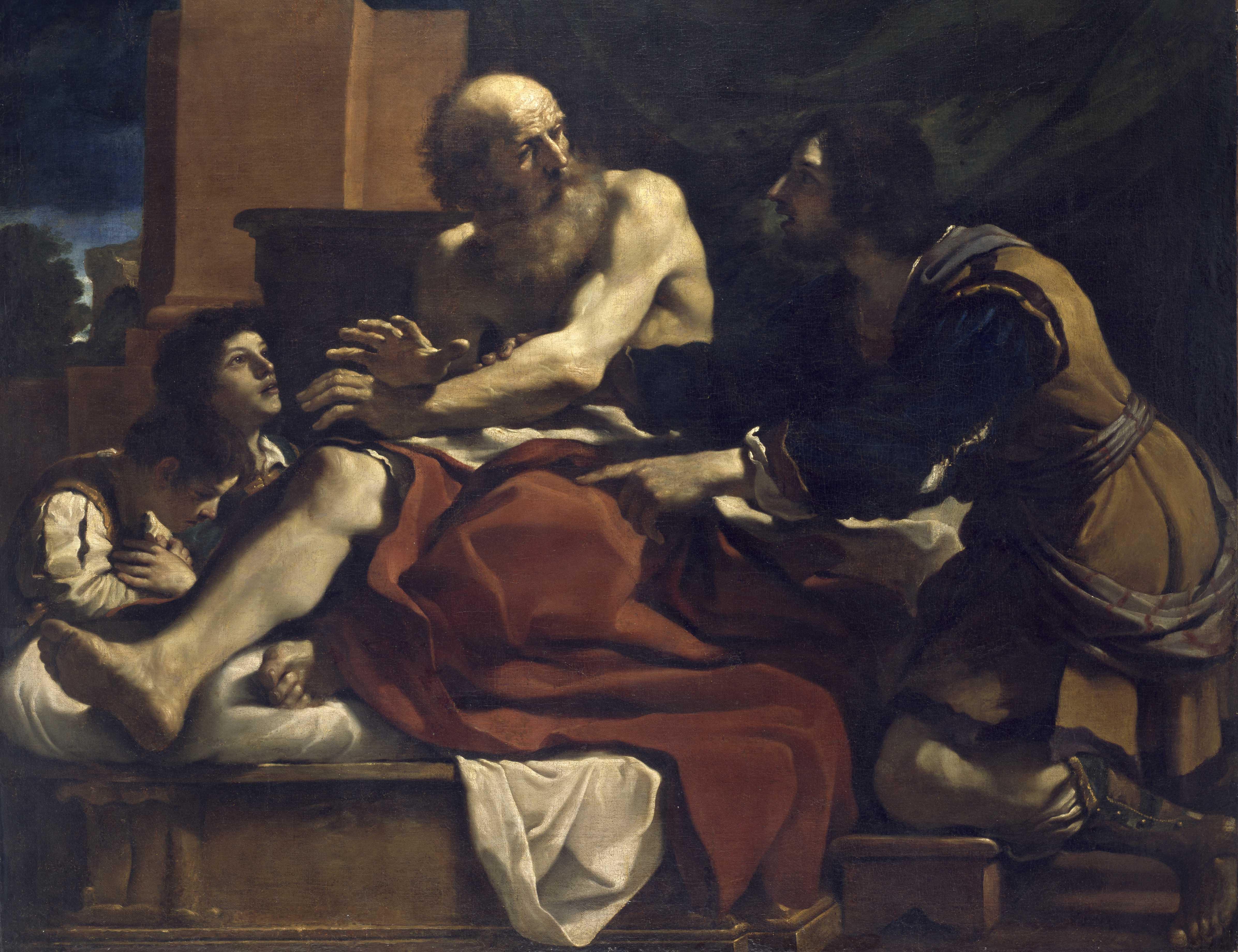God appears to Jacob "in the visions of the night," and tells him not to be afraid to go to Egypt to see Joseph. So Jacob gathers all the family, sons and grandchildren, and "all the souls of the house of Jacob, which came into Egypt, were threescore and ten." Joseph goes out to meet them in the land of Goshen, and hugs his father and weeps "on his neck a good while."
 |
| Salomon de Bray, Joseph Receives His Father and Brothers in Egypt, 1655 |
Chapter 47
So Joseph takes five of his brothers and goes to Pharaoh, whom they ask to be allowed to live in the land of Goshen because of the famine in Canaan. Pharaoh agrees to the request. Then Joseph presents Jacob to Pharaoh, who asks how old Jacob is. He replies that he is one hundred thirty, but he hasn't reached the age that his fathers did. Jacob gives Pharaoh his blessing. So Joseph takes his brothers out to "the best of the land, in the land of Rameses, as Pharaoh had commanded.
The famine continues, and Joseph gathers all the money in Egypt and Canaan and buys grain with it. When the money is gone, Joseph tells them that he will accept their cattle in payment for grain. With the money and the cattle gone, people say that they have nothing left but their land and their bodies, so Joseph accepts the land as payment for grain, "so the land became Pharaoh's," except for the land held by the priests. Then Joseph gives them seed to plant, with the agreement that every fifth part belongs to Pharaoh.
Jacob lives in the land of Goshen, in Egypt, for seventeen years. When he is one hundred forty-seven, he has Joseph put his hand under his thigh and swear not to bury him in Egypt but to take him back and entomb him with his ancestors.
Chapter 48
When he is about to die, Jacob asks Joseph to bring his two sons, Ephraim and Manasseh, for his blessing. Jacob's eyesight is failing, so he can't see the boys, but he tells Joseph that he had thought he would never see Joseph's face now, but "God hath shewed me also thy seed."
 |
| Guercino, Jacob Blessing Ephraim and Manasseh, before 1666 |
Chapter 49
Then Jacob calls all of his sons together to prophesy what will happen to each of them. Reuben, he says, is "Unstable as water," and will "not excel; because thou wentest up to thy father's bed; then defiledst thou it." (Reuben had slept with his father's concubine.) Simeon and Levi have "instruments of cruelty ... in their habitations." (They were responsible for the massacre in retaliation for the rape of Dinah.) He curses their anger and says "I will divide them in Jacob and scatter them in Israel."
Judah, on the other hand, "is a lion's whelp," who will dominate his enemies and be a ruler and lawgiver. Zebulon will live by the sea and deal with ships. "Issachar is a strong ass crouching down between two burdens." Dan will be a judge of his people. Gad will be overcome, but will himself overcome in the end. Asher's "bread shall be fat, and he shall yield royal dainties." Naphtali "giveth goodly words." Joseph has overcome what was done to him with the help of God, and will continue to prevail. As for Benjamin, he'll be like a wolf, devouring the prey in the morning and sharing it out at night. Naturally, all of these prophecies have been the subjects of extensive comment and exegesis, considering that they refer to the courses taken by the twelve tribes of Israel.
After reiterating his command (not just a wish) to be buried where Abraham, Sarah, Isaac, Rebekah, and Leah are buried, Jacob gives up the ghost. Joseph has him embalmed, and he is mourned for seventy days before Joseph gets Pharaoh's permission to take the body to the land of Canaan. Everyone, including the cattle, Pharaoh's servants and elders, chariots and horsemen, goes too: "it was a very great company."
After the funeral, Joseph and his brothers return to Egypt, though the brothers worry that, now that their father is dead, Joseph will decide to get even with them for casting him in the pit and selling him into slavery after all. But Joseph tells them not to worry: He isn't God, and it all turned out well in the end. He'll take care of them, he promises.
Joseph lives to be a hundred and ten, and gets to see his great-grandchildren in Ephraim's line and his grandchildren in Manasseh's. He was embalmed, and entombed in Egypt.
No comments:
Post a Comment